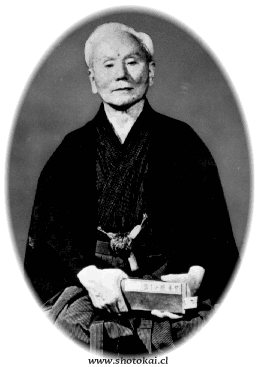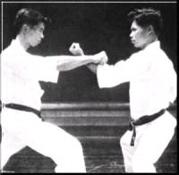What is karate?
Karate-do is a martial art that originated in Okinawa, which was then transported to Japan where it was modified and transformed into a way of life by Master Gichin Funakoshi. Before these modifications, it was just a group of techniques that permitted self-defense without weapons other than your hands and feet. Though there was some Chinese influences, the development was mostly Okinawan. When Master Funakoshi brought karate to mainland Japan in 1922, the art developed in many ways, taking on the character of a Japanese martial art.
GICHIN FUNAKOSHI
The Father of Karate-do
(1868-1957)

Master Funakoshi was influenced by a number of traditional martial arts from the larger Japanese islands such as kyudo, kendo, and judo. He modified karate, which until that moment had been called karate-jutsu, a series of fighting techniques, and placed emphasis on the philosophical as well as the self defence aspects of the discipline. In this way all that was learned could be extrapolated to the regular daily lives of the karate students. This is why karate has become a way of life, or karate-do (do, means way or road) for many karate practitioners of today. Gichin Funakoshi, thus, combined karate techniques with traditional Japanese budo (martial arts), inserting the essence of budo into the heart of karate - the real "way" of the martial arts.
The word budo is formed by two Chinese ideograms. The character of bu means to stop, and is located inside another ideogram that represents two crossed halberds or Japanese scything spears. Thus, bu, means to stop conflict. In Master Funakoshi's own words: "Since karate is a budo, this meaning should be deeply considered, and the fists should not be used heedlessly."
The word karate is also formed by two characters, the first one kara (empty) and the other te (hand), the first one having many different aspects to it.
The first one is the least subtle and the most straightforward. Through the practice of karate,
self defense techniques are learned without the use of weapons other
than hands, feet, or other parts of the body. Secondly, and in the words
of Master Funakoshi: "Just as it is the clear mirror that reflects
without distortion, or the quiet valley that echoes a sound, so must
one who would study
purge himself of selfish and evil thoughts, for only with a clear mind
and conscience can he [she] understand that which he [she] receives.
This is another meaning of the element karate-do / kara in karate-do."
Another meaning given by the Master is that of always striving to be
inwardly humble and outwardly gentle. This meaning specifies an internal emptiness
of egoism that leads karate students to act gently and moderately. Finally Master Funakoshi talked about the
elemental form of the universe, which is emptiness (kara, ku), "and thus, emptiness is form itself. The kara of karate-do has this meaning."
After what has been said, it is clear that karate-do and karate-budo are much more than mere self-defense techniques. Actually, such a definition is a far shot from the real essence of karate as a philosophy, which strives to develop the inner qualities of a human being and the search of perfection of their character, through strenuous training in the do and budo martial arts.
Gichin Funakoshi's Dojo Kun
(Precepts of Karate Training)
Hitotsu. Jinkaku Kansei ni Tsutomuro Koto.
Hitotsu. Makoto no Michi wo Mamoru Koto.
Hitotsu. Doryoku no Seishin o Yashinau Koto.
Hitotsu. Reigi o Omonzuru Koto.
Hitotsu. Kekki no Yu o Imashimuru Koto.
Seek Perfection of Character
Defend the Path of Truth
Endeavor to Excel
Display Courtesy
Refrain from Violent Behavior
